Art World
Here Are 9 Spaces You Need to Visit to Understand LA’s Vibrant Art Scene
Here are the spots not to miss.
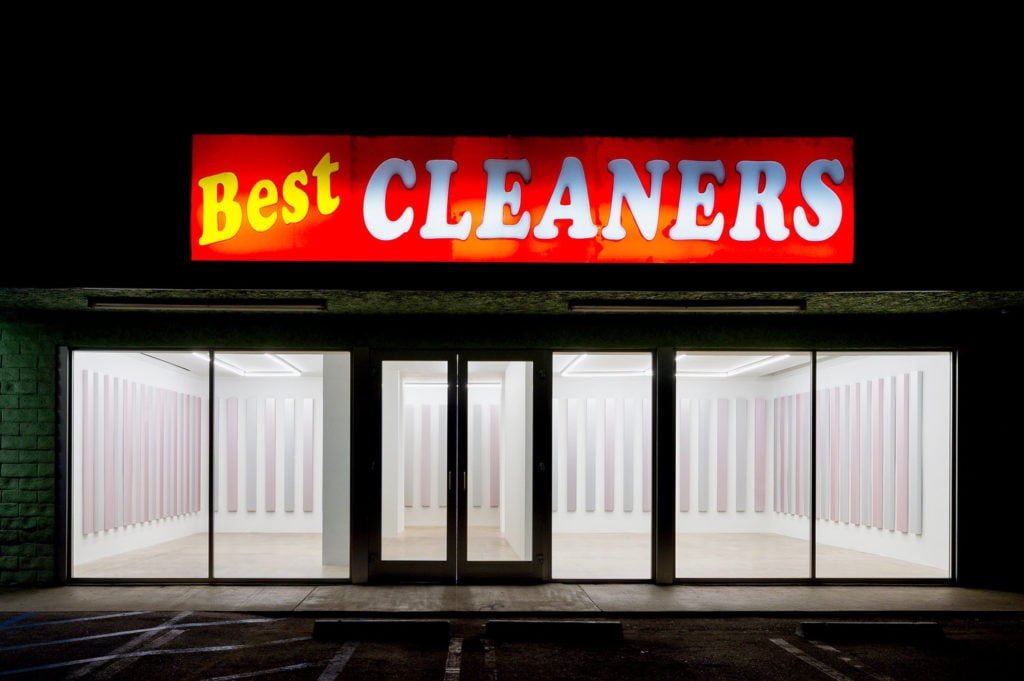
Here are the spots not to miss.

Catherine Wagley

For years, an ambitious Los Angeles gallery hopper could head out on a Saturday morning and hit nearly every worthwhile exhibition in the city, zig-zagging between east side neighborhoods before heading west.
But the exponential growth in the number of LA art spaces over the past five years has made this impossible. Young dealers, mid-size spaces, and mega-galleries have put down roots everywhere in this sprawling city, which makes seeing art in Los Angeles a geographically and culturally variable experience.
So where does one begin? Just in time for Frieze Los Angeles, we’ve put together a guide looking at the most vibrant, cutting-edge art spaces in town.
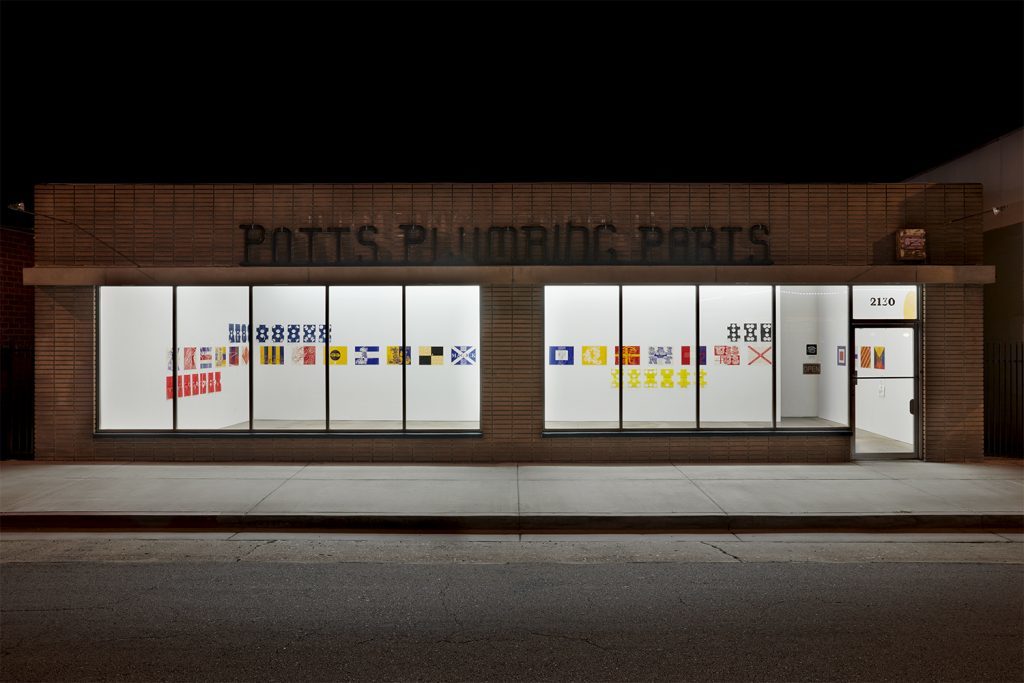
View of I “I Wish to Communicate With You: Corita Kent & Matt Keegan” at POTTS, Los Angeles.
The late Corita Kent, the radical former nun and Pop Conceptualist, designed 26 flags in 1968, one for each letter of the alphabet, all based on maritime signals. The sassy works, which blur cultural references (Book of Revelation meets Winnie the Pooh), currently hang at POTTS, a collectively run space that’s also showing works by Matt Keegan. His paper cut-outs, also done in primary colors, act like punctuation marks on Kent’s alphabet.
The space is run by six collaborators out of a former plumbing shop (also called POTTS) and combines exhibitions of new art with rediscoveries of older work. Exhibition design is perhaps the group’s forte, and since their tall, wide windows open onto the street, their shows are eye candy to passerby.
POTTS is at 2130 Valley Boulevard, Alhambra.
“I Wish to Communicate With You: Corita Kent & Matt Keegan” is on view through April 14.
Human Resources is an energizer bunny on the fringes. It always has something on, often pulled together on a tiny budget, maybe at the last minute. The long-established, artist-founded space moved from a tiny Chinatown office to a nearby sprawling former theater in 2011. This gritty, spacious, and adaptable gallery is run by volunteers with a board and a shifting programming committee, and serves as a stage for young artists and established ones alike.
Ron Athey, Narcissister, and A.K. Burns have all shown memorable work in the space, as have younger performers, such as Elliot Reed and Keijaun Thomas. “2019-Q1,” the gallery’s current three-month program series, features weekly events and exhibitions that last from 48 hours to one week. A rave on February 16 features DJs and artists Baba Electronica, based in Brussels, and Los Angeles-based Tyler Matthew Oyer.
Human Resources Los Angeles is at 410 Cottage Home Street, Los Angeles.
“2019-Q1” is on view through March 31.
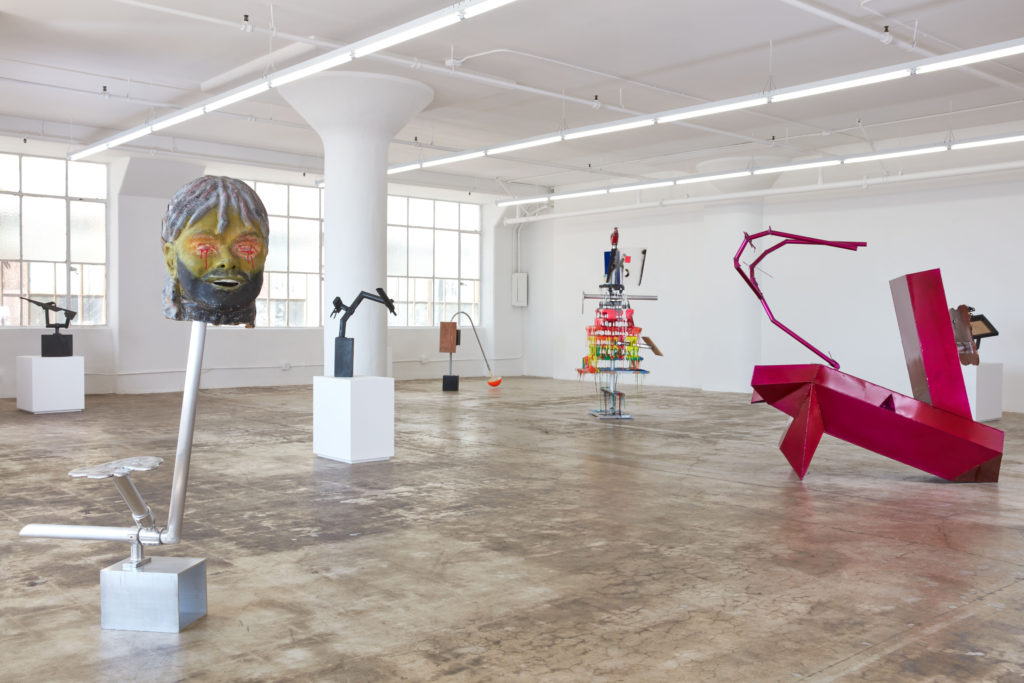
Installation view of “Harry Dodge: Works of Love” at JOAN, Los Angeles, photo by Paul Salveson.
The best afternoon I spent at JOAN involved tattoos and improvised dancing on blankets on the floor. Artist-choreographer Hannah van der Kolk held court and the looseness of her performance contrasted with Blair Saxon-Hill’s fully realized, quaint, and intricate assemblages hanging on the walls around us.
Since its inception, the non-profit has combined experimental performance with pristine exhibitions. The space, now on the seventh floor of the gallery-friendly downtown Bendix building, takes its name from history’s strong female Joans (D’Arc, Didion, Mitchell, Brown, etc). Curators Gladys Hernando, Rebecca Matalon, and Summer Guthery co-founded it in 2014, though Guthery now serves as director and sole curator (her co-founders both took out-of-state jobs). On February 16 and 17, London-based artist Sophie Jung will perform with seven actors, who will explore their experiences with typecasting as they navigate Jung’s found-object installation.
JOAN is at 1206 Maple Avenue, Suite 715, Los Angeles.
“Sophie Jung, Dramatis Personae” will be performed on February 16 and 17 at 7:30 p.m.
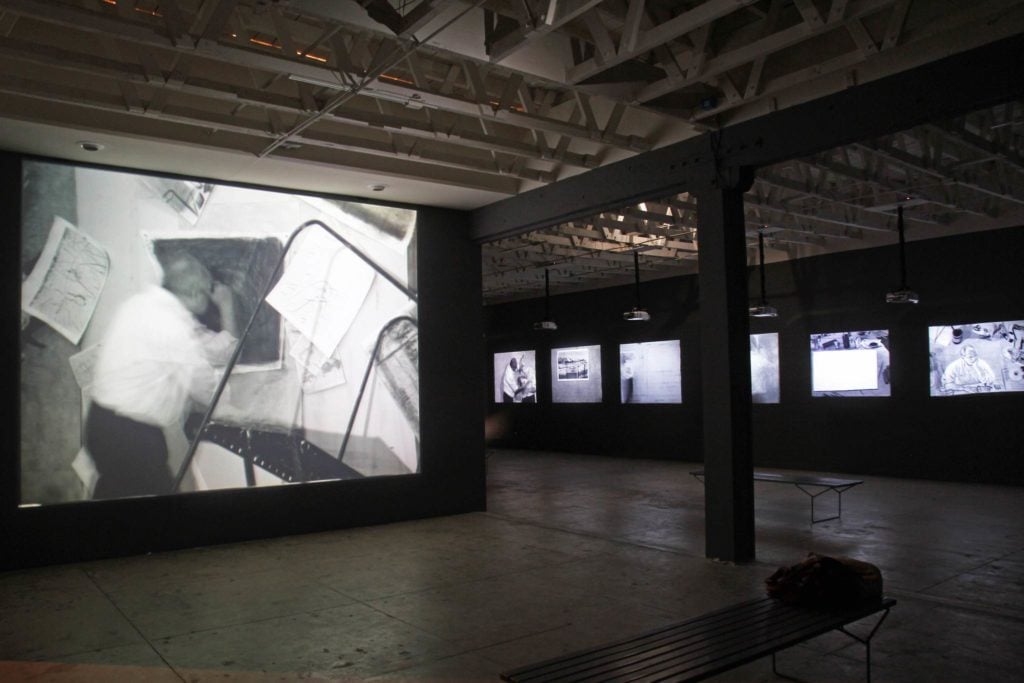
Installation view of “William Kentridge: Journey to the Moon” at the Underground Museum.
The Underground Museum’s first show featured fake masterpieces—a Dan Flavin neon, a Jeff Koons vacuum—made by artist Noah Davis, who opened the museum with artist Karon Davis in 2012. They couldn’t get major lenders to give them such blue-chip works, and remaking them and installing them professionally in the yet-to-gentrify West Adams neighborhood was something of a proposal (and a provocation): major art should be accessible to the public here, too. Neighbors wandered in and a man with a guitar used to come play at the plywood bar the couple had built.
Then, near the time of Noah’s untimely death, the Museum of Contemporary Art partnered with the space and began lending to it, making its early proposal a reality. The space remains neighborly, partly thanks to community programming in the backyard garden, and its current exhibition of Deana Lawson’s photographs has the perfectly appointed punch of the best Underground shows. Lawson’s large portraits hang on mauve walls, their careful installation accentuating rather than muffling their fiery energy.
The Underground Museum is at 3508 West Washington Boulevard, Los Angeles.
“Deana Lawson: Planes” is on view through February 17.
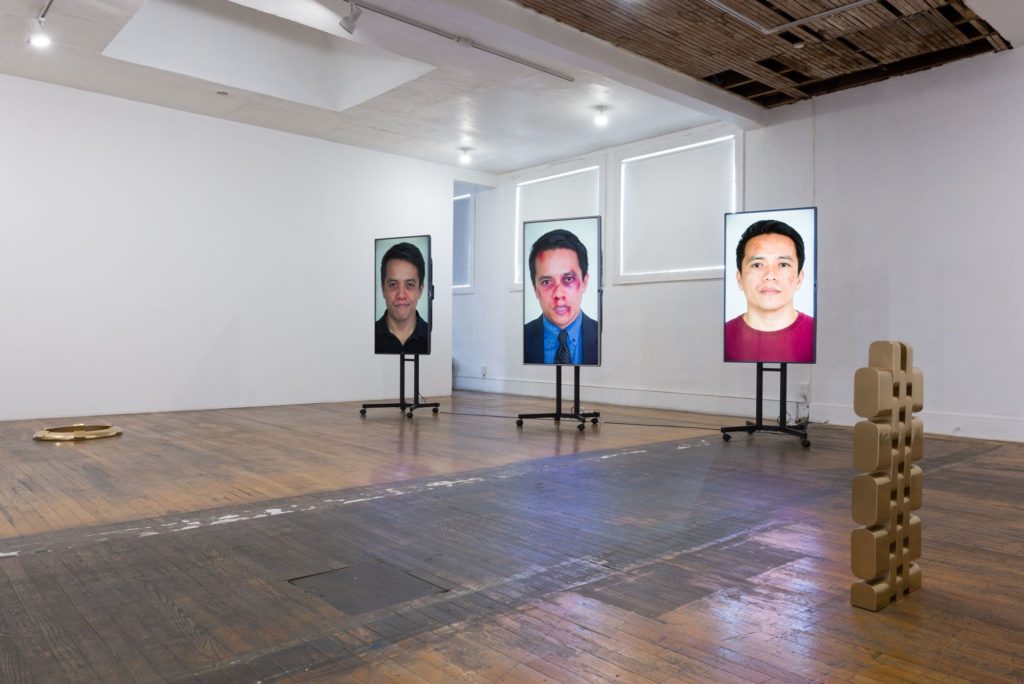
Installation view, “All of M” at Commonwealth & Council.
Started in the apartment of artist Young Chung, Commonwealth & Council moved into a warm, wood-floored Koreatown studio in 2011 and began its transition from artist-run space to commercial gallery. It still hovers somewhere in between. The roster has the feeling of an expanding web of friends—many of the gallery’s artists have known each other for years—and the gallery functions like a familial incubator.
The goal of the space is more to build a network (dominated by women, artists of color, and queer artists) than a market. Kibum Kim, who formerly led the gallery Skibum MacArthur, joined as Chung’s partner last year. For one of C&C’s current exhibitions, artist Kenneth Tam filmed men in white tuxes slow-dancing timidly in a spotlit room, talking about their prom experiences while fondling sand-filled, slug-like black latex sculptures.
Commonwealth & Council is at 2006 West 7th Street, #220, Los Angeles.
“Kenneth Tam: Tamborine” and “David Alekhuogie: to live & die in LA” are on view through March 2.

Installation view, “Andrei Koschmieder Experience Economy Class” at Jenny’s.
A decade ago, there were more midsize galleries in worn-down strip malls scattered across Los Angeles; today, few remain. But Jenny’s—a one-room space with no separate office, which opened in 2014 behind an insurance shop just off an open-air walkway—is still going strong.
The program has a darkly quirky edge, and features emerging and under-exposed artists, mostly from the US and Europe (Jenny’s did a series of pop-up shows in London last year). In 2015, Liz Craft turned the whole room into a spider web that ensnared human-sized marionettes; two years later, Renaud Jerez built robot-like mannequins out of PVC pipe. Most recently, Andrei Koschmieder installed decrepit, rusty, paper-and-epoxy suitcase sculptures to fill out the gallery.
Jenny’s is at 4220 Sunset Boulevard, Los Angeles.
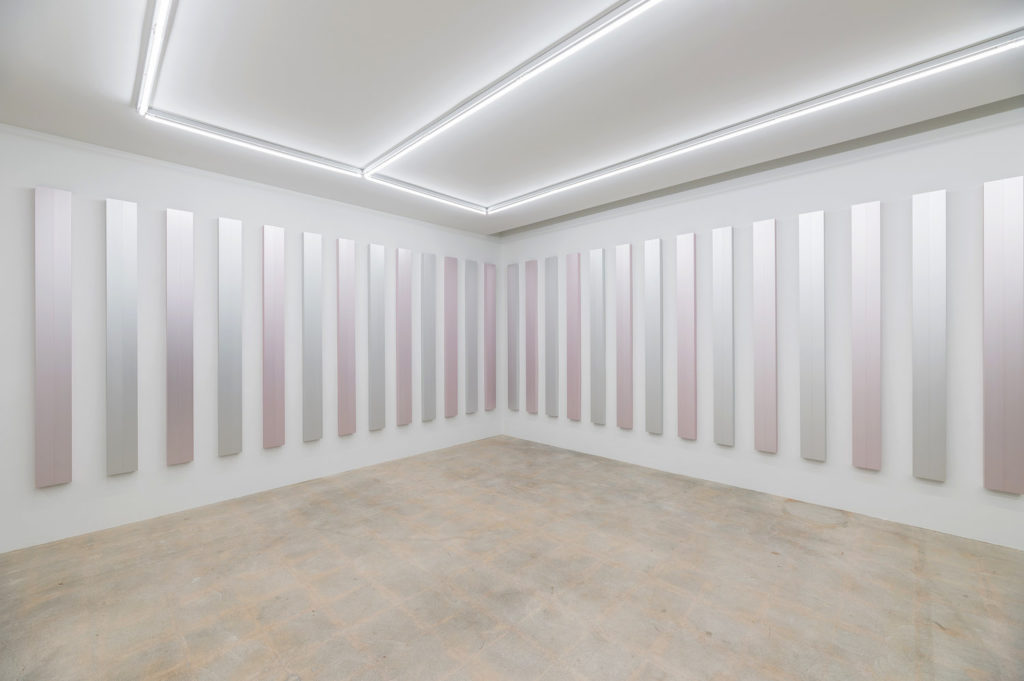
Installation view, “Tadaaki Kuwayama: TK286-1/2-2-99, 1999” at Nonaka-Hill.
A neon “Best Cleaners” sign, left over from a previous tenant, still hangs above Nonaka-Hill, which is a year old and is among the newest additions to Highland Avenue, Hollywood’s gallery row. The gallery focuses exclusively on artists from Japan, and is run by Rodney Nonaka-Hill (who co-ran Marc Foxx gallery for 15 years) and his partner, Taka Nonaka-Hill, who is originally from Japan. The gallery has no tight theoretical agenda, and the mission instead is to show works by artists who rarely show elsewhere in Los Angeles.
For Matsumoto Toshio’s December video show, the gallery changed its hours from 5 p.m. to 11 p.m. so that the wall-length projections could be seen at night through the storefront windows. Right now, shimmering, painted aluminum diptychs by Tadaaki Kuwayama run from one end of the space to the other.
Nonaka-Hill is located at 720 North Highland Avenue, Los Angeles.
“Tadaaki Kuwayama” is on view through February 16.
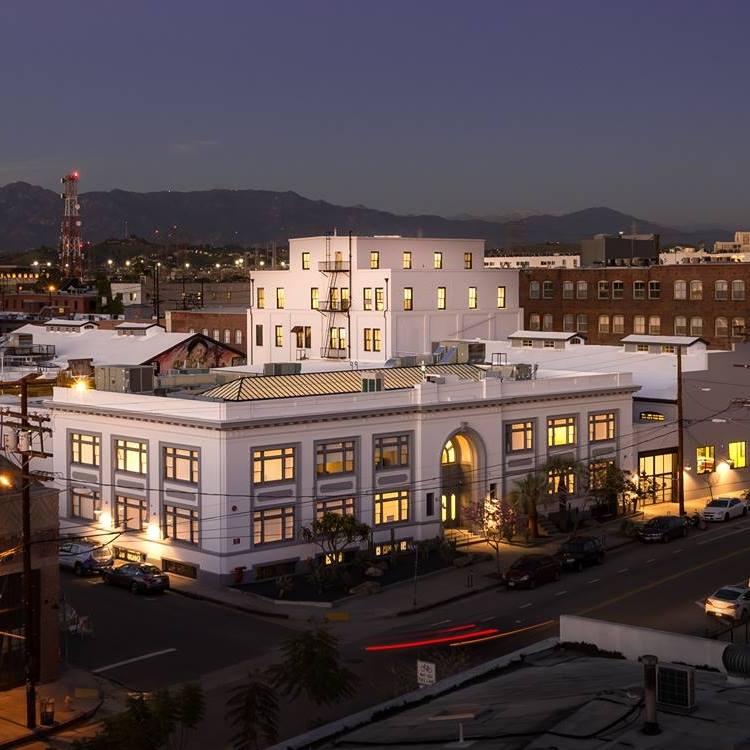
Hauser & Wirth in Los Angeles. Courtesy of Hauser & Wirth. Photo: Joshua Targownik / targophoto.com.
When Hauser & Wirth opened its Los Angeles complex in 2016, international mega-galleries had just begun their descent onto the city, sweeping up still-affordable warehouses. This one outshone the others, transforming a former factory into three separate galleries, an open-air courtyard, restaurant, and upstairs program space.
In press releases, the gallery’s founders spun Hauser & Wirth Los Angeles as an educational kunsthalle of sorts, even though most shows here (from the current Zoe Leonard installation to the recent Mark Bradford and Louise Bourgeois presentations) have been distinctly commercial. Still, the complex has become the bustling weekend spot the the nearby Museum of Contemporary Art has yet to become.
Hauser & Wirth is at 901 East 3rd Street, Los Angeles.
“Annie Leibovitz: The early years, 1970–1983” and “Piero Manzoni: Materials of His Time” are on view through April 7.
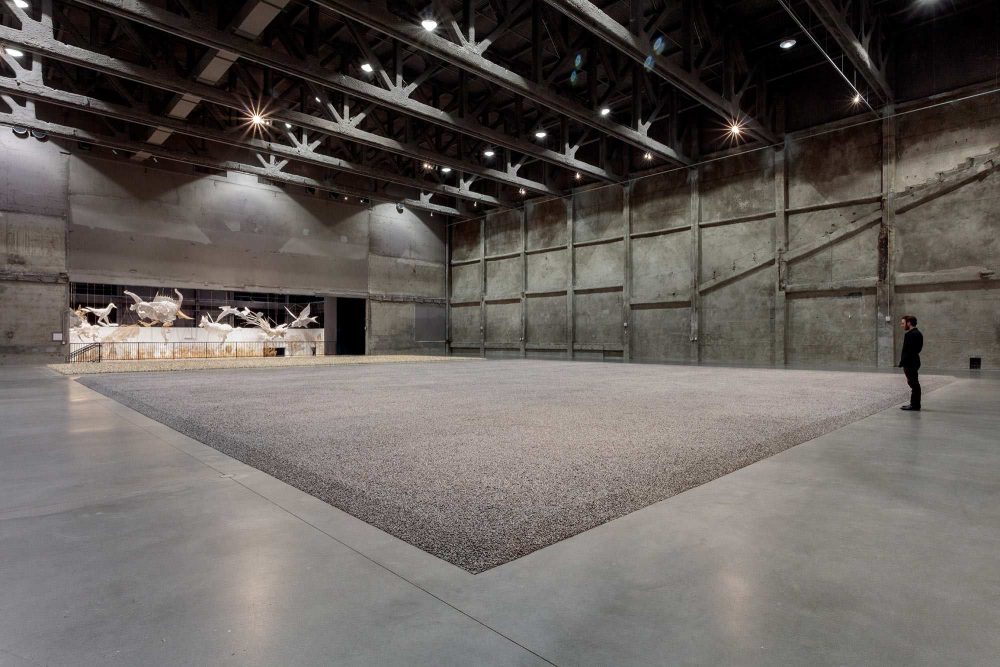
Installation view of “Ai Weiwei: Life Cycle” at Marciano Art Foundation.
The Scottish Rite Masonic Temple on Wilshire Boulevard served as the National Guard’s base during the Rodney King riots and hosted weapons and tactical training programs for the Los Angeles Police Department before that. So it had a charged history long before the Marciano brothers turned it into the home for their collection, making it part of a growing trend of museums established by private collectors.
Like its bigger, more expensive local predecessor, the Broad, the Marciano Art Foundation tends toward the safe and established (Ai Weiwei, Olafur Eliasson). But the space itself is an eccentric treasure, with gold water fountains and original mosaic murals. A permanent exhibition off the balcony features items found in the building when renovations began, including wigs and photographs of costumed Masons.
The Marciano Art Foundation is at 4357 Wilshire Boulevard, Los Angeles.
“Ai WeiWei’s Life Cycle” is on view through March 3.